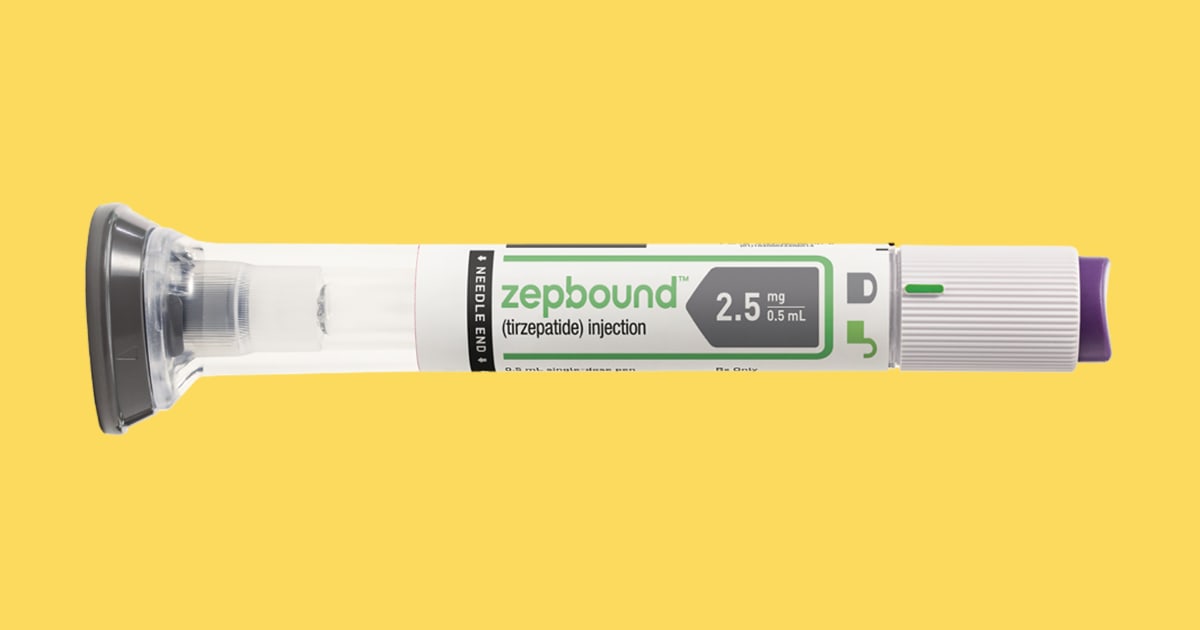The Food and Drug Administration on Wednesday approved Zepbound, a new weight loss drug from drugmaker Eli Lilly that was shown in clinical trials to help people lose up to 52 pounds in 16 months.
Zepbound is the latest entrant into the field of powerful new drugs that already includes Novo Nordisk’s Ozempic and Wegovy and Lilly’s Mounjaro.
The FDA approved the drug for adults with obesity or who are overweight with at least one weight-related condition.
In a release, Lilly said Zepbound should be available in the U.S. by the end of the year. It will carry a list price of about $1,060 for a month’s supply.
The cost may put the new drug out of reach for many people given that insurance companies are often reluctant to cover weight loss medications, and Medicare, by law, does not cover them.
“The current cost is too expensive for the general population,” Dr. Nishant Shah, a preventative cardiologist at Duke University Medical Center in Durham, North Carolina. “We have to be able to get to patients in an affordable way.”
In the United States, 4 in 10 adults have obesity, according to the Centers for Disease Control and Prevention.
Although the drug carries a steep price, some analysts have anticipated it will become the best-selling drug in history.
Zepbound is part of a class of drugs called GLP-1 agonists, which mimic a hormone that helps reduce food intake and appetite. However, Zepbound also imitates a second hormone, called GIP, which — along with reducing appetite — may also improve how the body breaks down sugar and fat.
Zepbound shares the same active ingredient — tirzepatide — as Lilly’s popular diabetes medication Mounjaro.
In a phase 3 clinical trial, Zepbound led to an average weight loss of 22.5% body weight, or about 52 pounds, surpassing all currently available weight loss medications on the market. The participants in the study had obesity or were overweight with at least one weight-related condition.
“This is the most effective form of pharmaceutical obesity treatment ever,” said Dr. Christopher McGowan, a gastroenterologist who runs a weight loss clinic in Cary, North Carolina.
He added that the weight loss seen from the medication is approaching the weight loss seen with bariatric surgery.
“That is a big deal,” he said.
When it comes to whether a patient should choose between Lilly’s new drug and Wegovy, McGowan said the key factors to consider are insurance coverage and the patient’s individual response to each treatment.
“When I’m talking to a patient, I’m going to discuss both of them,” he said.
More news on weight loss drugs
Like other drugs in its class, however, Zepbound carries a risk of gastrointestinal issues, including nausea, diarrhea, vomiting, constipation and stomach pain, according to the FDA.
The label doesn’t specifically mention a risk of stomach paralysis, also called gastroparesis, a more serious complication that some patients have reported as weight loss drugs have skyrocketed in popularity. (In August, Lilly and Novo Nordisk were sued over claims that their blockbuster drugs Mounjaro and Ozempic caused stomach paralysis.)
Dr. Daniela Hurtado Andrade, an endocrinologist at the Mayo Clinic, said that while gastrointestinal issues are very common with GLP-1 medications, most of the side effects will not affect a person’s quality of life.
“I’ve had to stop the medications only on very rare occasions,” said Andrade, who prescribes Mounjaro off-label for weight loss. “But the reality is the majority of patients will be able to find a dose that is not causing significant side effects.”
To mitigate side effects, doctors recommend starting patients on a lower dose of the medication and incrementally raising it over a few weeks, she said.
“In general, we titrate the dose up every four weeks,” she said. But “I’ve had patients who have had to stay on the lowest for 12 weeks and then go up and stay on the second dose for another 12 weeks.”
Alexis Mitchell, 30 of Charlotte, North Carolina, had been overweight for most of her 20s. It was only last year, following a health scare linked to high blood pressure and prediabetes, that her doctor recommended Mounjaro off-label for weight loss.
She began taking a 2.5-milligram weekly dose of Mounjaro and gradually increased it to 15 mg. She started to see results immediately.
“For me, that was a game changer,” Mitchell said. “Like OK, you need to change your life around right now. Like, there are no more games.”
She has experienced common side effects, including nausea, constipation, migraines, stomach pain and body aches, but the benefits she said have made the discomfort worthwhile.
“The weight loss outweighs the side effects 100% for me,” she said. “I’m down 123 pounds in a year. I mean, I couldn’t have done it without Mounjaro.”




